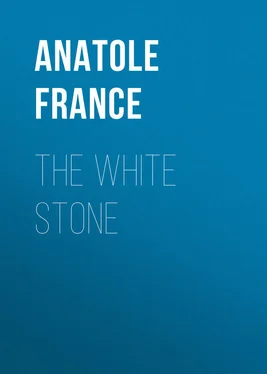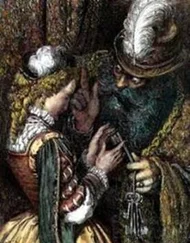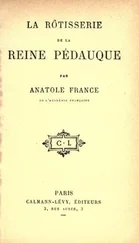Anatole France - The White Stone
Здесь есть возможность читать онлайн «Anatole France - The White Stone» — ознакомительный отрывок электронной книги совершенно бесплатно, а после прочтения отрывка купить полную версию. В некоторых случаях можно слушать аудио, скачать через торрент в формате fb2 и присутствует краткое содержание. Жанр: foreign_antique, foreign_prose, на английском языке. Описание произведения, (предисловие) а так же отзывы посетителей доступны на портале библиотеки ЛибКат.
- Название:The White Stone
- Автор:
- Жанр:
- Год:неизвестен
- ISBN:нет данных
- Рейтинг книги:4 / 5. Голосов: 1
-
Избранное:Добавить в избранное
- Отзывы:
-
Ваша оценка:
- 80
- 1
- 2
- 3
- 4
- 5
The White Stone: краткое содержание, описание и аннотация
Предлагаем к чтению аннотацию, описание, краткое содержание или предисловие (зависит от того, что написал сам автор книги «The White Stone»). Если вы не нашли необходимую информацию о книге — напишите в комментариях, мы постараемся отыскать её.
The White Stone — читать онлайн ознакомительный отрывок
Ниже представлен текст книги, разбитый по страницам. Система сохранения места последней прочитанной страницы, позволяет с удобством читать онлайн бесплатно книгу «The White Stone», без необходимости каждый раз заново искать на чём Вы остановились. Поставьте закладку, и сможете в любой момент перейти на страницу, на которой закончили чтение.
Интервал:
Закладка:
“What blessings has not the Empire bestowed throughout the world! To the Empire is due the profound tranquillity which the countryside enjoys. The seas are swept of pirates, and the highways of robbers. From the befogged Ocean to the Permulic Gulf, from Gades to the Euphrates, the trading of merchandise proceeds in undisturbed security. The law protects the lives and property of all. Individual rights must not be infringed upon. Liberty has henceforth no other limits than its lines of defence, and is circumscribed for its own security alone. Justice and reason rule the world.”
Unlike his two brothers, Annæus Mela had not intrigued for honours. Those who loved him, and their name was legion, for he was ever in his intercourse affable and extremely pleasant, attributed his detachment from public affairs to the moderation of a mind attracted by the blessings of tranquil obscurity, a mind which had no other care than the study of philosophy. But those who observed him with greater insight were under the impression that he was ambitious after his own fashion, and that like Mæcenas, he, a simple knight, was consumed with the envy of enjoying the same consideration as the consuls. Lastly, certain evil-minded individuals believed that they discerned in him the greed of the Senecas for the riches which they affected to despise, and thus did they explain to themselves that Mela had for a long time lived in obscurity in Betica, giving himself up entirely to the management of his vast estates, and that subsequently summoned to Rome by his brother the philosopher, he had devoted himself to the administration of the finances of the Empire, rather than go in the quest of high judiciary or military posts. His character could not be readily determined from his utterances, for he spoke the language of the Stoics, a language equally adapted for the concealment of the weaknesses of the mind and the revelation of the grandeur of one’s sentiments. It was in those days the height of elegance to utter virtuous discourse. At any rate, there is no doubt that Mela spoke his thoughts.
He replied to his brother that, although not versed in public affairs like himself, he had had occasion to admire the power and wisdom of the Romans.
“They reveal themselves,” he said, “in the most remote parts of our own Spain. But it is in a wild pass of the mountains of Thessaly that I have been made to appreciate at its highest the beneficent majesty of the Empire. I had come from Hypata, a town renowned for its cheeses, and whose women were notorious for witchcraft, and I had been riding for some hours along mountain paths, without coming across a human face. Overcome by the heat and fatigue, I tethered my horse to a tree by the road, and lay down under an arbutus-bush. I had been resting there a short while only, when there came along a lean old man bowed down under a load of branches. Utterly exhausted, he tottered in his steps, and just as he was about to fall, exclaimed: ‘Cæsar.’ On hearing such an invocation escape the lips of a poor woodcutter in this stony solitude, my heart overflowed with veneration for the tutelary City, which inspires, even unto the farthermost lands, the most rustic of minds with so great a conception of its sovereign providence. But sadness and a feeling of distress mingled with my admiration, brother mine, when I reflected upon the injury and insults to which the inheritance of Augustus and the fortune of Rome were exposed through men’s folly and the vices of the century.”
“I have witnessed on the spot, brother mine,” replied Gallio, “the crimes and follies which sadden your mind. My cheek has blanched under the gaze of the victims of Caius from my seat in the Senate. I have held my peace, as I did not despair of better days. I am of the opinion that good citizens should serve the Republic under bad princes rather than shirk their duty in a useless death.”
As Gallio was uttering these sentiments, two men, still in their youth and wearing the toga, came up to him. The one was Lucius Cassius, of a Roman family, plebeian but ancient, and having attained distinction. The other, Marcus Lollius, son and grandson of consuls, and moreover of a knightly family, which had sprung from the free town of Terracina. Both had frequented the schools of Athens, and acquired a knowledge of the laws of nature of which those Romans who had not been in Greece were totally ignorant.
At the present moment, they were studying in Corinth the management of public affairs, and the proconsul surrounded himself with them as an ornamental adjunct to his magistracy. Somewhat behind them, the Greek Apollodorus, wearing the short cape of the philosophers, bald of head, and with Socratic beard, sauntered along, with uplifted arm and gesticulating fingers, discussing with himself.
Gallio welcomed all three of them in kindly fashion.
“The rose of dawn is already fading,” he said, “and the sun is beginning to shed its steeled darts. Come along, my good friends, to the coolness of the shady foliage beyond.”
Saying this, he led them along the banks of a stream whose babbling murmur invited peaceful reflections, until they had reached an enclosure of verdant bushes in the midst of which lay in a hollow an alabaster basin filled with limpid waters on whose surface floated the feather of a dove, which had just bathed in them, and which was now cooing plaintively from a branch. They took their seats on a semicircular marble bench supported by griffins. Laurel and myrtle bushes blended their shadows about it. Statues encircled the enclosure. A wounded Amazon gracefully coiled her arm about her head. Grief appeared a thing of beauty on her lovely face. A shaggy Satyr was playing with a goat. A Venus, emerging from the bath, was drying her wetted limbs along which a shudder of pleasurable emotion seemed to run. Near by, a youthful Faun was smilingly placing a flute to his lips. His face was partly concealed by the branches, but his shining belly glistened amid the leafage.
“That Faun seems animated,” remarked Marcus Lollius. “One could imagine that a gentle breathing was causing his bosom to heave.”
“He is true to life, Marcus,” said Gallio. “One expects to hear rustic melodies flow from his flute. A Greek slave carved him out of the marble, in imitation of an ancient model. The Greeks formerly excelled in the making of these fanciful statues. Several of their efforts in this style are justly renowned. There is no gainsaying it: they have found the means of giving august traits to the gods and of expressing in both marble and bronze the majesty of the masters of the world. Who but admires the Olympian Zeus? And yet, who would care to be Phidias!”
“No Roman would assuredly care to be Phidias,” exclaimed Lollius, who was spending the fortune he had inherited from his ancestry in ornamenting his villa at Pausilypum with the masterpieces of Phidias and Myron brought over from Greece and Asia.
Lucius Cassius was of the same opinion. He argued with some warmth that the hands of a free man were not made to wield the sculptor’s chisel or the painter’s brush, and that no Roman citizen would condescend to the degrading work of casting bronze, hewing marble into shape, and painting forms on a wall.
He professed admiration for the manners of the ancient times, and vaunted at every opportunity the ancestral virtues.
“Men of the stamp of Curius and Fabricius cultivated their lettuce-beds, and slept under thatched roofs,” he said. “They wot of no other statue than the Priapus carved in the heart of a box-tree, who, protruding his vigorous pale in the centre of their garden, threatened pilferers with a terrible and shameful punishment.”
Mela, who was well versed in the annals of Rome, opposed to this opinion the example of an old patrician.
“In the days of the Republic,” he pointed out, “that illustrious man, Caius Fabius, of a family issued from Hercules and Evander, limned with his own hand on the walls of the Temple of Salus paintings so highly prized that their recent loss, on the destruction of the temple by fire, has been considered a public misfortune. It is moreover related that he did not doff his toga when painting, thus to indicate that such work was not unworthy of a Roman citizen. He was given the surname of Pictor, which his descendants were proud to bear.”
Читать дальшеИнтервал:
Закладка:
Похожие книги на «The White Stone»
Представляем Вашему вниманию похожие книги на «The White Stone» списком для выбора. Мы отобрали схожую по названию и смыслу литературу в надежде предоставить читателям больше вариантов отыскать новые, интересные, ещё непрочитанные произведения.
Обсуждение, отзывы о книге «The White Stone» и просто собственные мнения читателей. Оставьте ваши комментарии, напишите, что Вы думаете о произведении, его смысле или главных героях. Укажите что конкретно понравилось, а что нет, и почему Вы так считаете.










